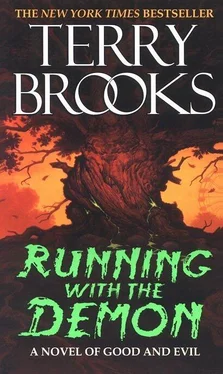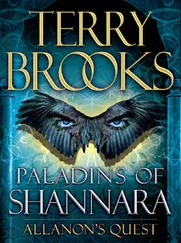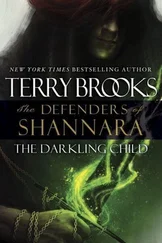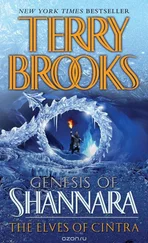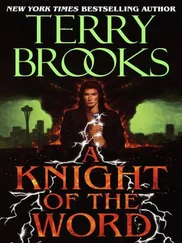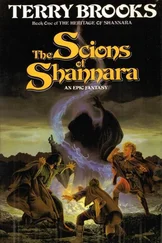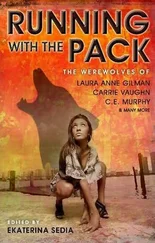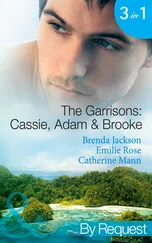There was an uneasy pause. His hand stopped moving in her hair.
"What's wrong?" she asked.
He seemed to be thinking it over. "What do you think would have happened, Nest, if your father had touched you?"
She was quiet for a moment. "I don't know."
She heard him sigh. "I'm going to tell you something I've kept secret until now. I'm going to tell you because you need to know. Because someday the knowledge might save your life."
His face lowered into her hair. "I dream about the future, Nest. I dream about it every night of my life. I dream about the way things will be if everything breaks down and the feeders consume us. I dream about the end of civilization, the end of the world. The dreams are real, not pretend. It is the price I pay for being a Knight of the Word. It is a reminder of what will happen if I fail. More importantly, it is a window into time that lets me discover exactly what it is I must try to prevent."
He stepped away from her, keeping his hands on her shoulders. Rain glistened on his lean face and in his mud–streaked hair. "I found out about you through my dreams. I found out that the demon was your father. But most important of all, I saw what you became because he touched you here tonight, in this place, in this park. I came to Hopewell to stop that from happening."
"What did I become?" she asked, her voice shaking.
He shook his head. "It doesn't matter. It can't happen now. The window of opportunity is past. The demon is gone. The events can't re–create themselves. You won't become what I saw in my dream. You will become what you make of yourself, but it won't be a bad thing. Not after what you did tonight. Not after you've heard what I have to say.".
His smile was tight and bitter. "Some of what I do as a Knight of the Word is difficult for me to live with. I can't always change the future with words and knowledge. The demons I hunt are elusive and clever, and I don't always find them. Sometimes they accomplish what they intend, and I am left to deal with the results. Because I know from my dreams what those results signify, I must change them any way I can."
His brow furrowed with hidden pain. "It was necessary for you to face your father and reject him. I came to Hopewell to see if you could do that. I would have destroyed him beforehand if I could, but I knew from the beginning that my chances were poor. I knew it would probably be left up to you. I gave you what help I could, but in my heart, Nest, in my soul, I knew it would come down to you."
He stood tall in front of her, suddenly unapproachable, become as impenetrable as the darkness that shrouded them both.
"Do you understand?" he asked softly. "If you had failed in what was required of you, if the demon had touched you and you had become what he intended, if you had been unable to withstand him and your magic had darkened to his use …"
He took his hands from her shoulders, his voice trailing off. Their eyes locked. "My purpose in coming here, Nest, was to stop you from becoming the creature I saw in my dreams." He paused, letting the full import of his words sink in. "I would have done whatever was needed to accomplish that."
Recognition of his meaning ran through her like shards of ice, and she stared at him in horror and disbelief. Whatever was needed. She tried to say something in response, to let him know what she was feeling, but she could not find the words. The chasm he had opened between them was so vast that she could not find a way to bridge it.
"Good–bye, Nest," he said finally, stepping back from her, his mouth crooked in a tight, sad smile. "I wish I could have been your father."
He stood there a moment longer, a lean, hunched figure in the rain–drenched night. Her savior. Her executioner. She felt her heart break with the realization.
Then he turned away, his black staff gleaming, and disappeared into the night.
TUESDAY, JULY 5
By morning, news services from as far away as Chicago were reporting the story. Variations in word usage and presentation aside, it read pretty much the same everywhere. A disgruntled union worker at MidCon Steel in Hopewell, Illinois, had attempted to sabotage a fireworks display sponsored by the company. Derry Howe, age thirty–eight, of Hope–well, was killed when the bomb he was attempting to plant within the staging area exploded prematurely. Also injured were Robert Freemark, aged sixty–five, of Hopewell, a retired member of the same union; two members of the staging crew; and several spectators. In a related incident, a second man, Junior Elway, aged thirty–seven, of Hopewell, was killed attempting to plant a bomb in the fourteen–inch mill at MidCon during a break in his work shift. It was thought that the dead men, longtime friends and union activists, were acting in concert, and that the bombs were intended to halt efforts by MidCon to reopen the company in defiance of a strike order and to initiate a new round of settlement talks. Police were continuing with their investigation.
In a second, much smaller news item, the weather service reported extensive damage to parts of Sinnissippi Park in the wake of a thunderstorm that passed through Hopewell sometime around midnight. High winds and lightning had toppled a white oak thought to be well over two hundred years old as well as several smaller trees within a heavily wooded section of the park. The storm had moved out of the area by early morning, but phone and electrical lines were still down in parts of the city.
Nest heard most of it from television reports as she wandered back and forth between the Community General Hospital lounge and the lunchroom waiting for her grandfather to wake up. It had been almost midnight when she walked home through the driving rain, the park deserted save for a cluster of patrol cars parked in front of the pavilion and toboggan slide, their red and blue lights flashing. Police officers in yellow slickers were stringing tape and examining the grounds, but she didn't attach any particular significance to the matter until she got home and found another cruiser parked in her driveway and more officers searching her home. She was told then that her grandfather had been taken to the hospital with a broken shoulder, cracked ribs, and possible internal injuries following a bombing attempt in the park, and that she had been reported missing and possibly kidnapped.
After determining that she was all right, they had driven her to the hospital to be with her grandfather. Old Bob had been treated and sedated, and she was told by the nurses on duty that he would probably sleep until morning. She had sufficient presence of mind to call Cass Minter to let her know she was all right and to tell her where she was. Even though it was almost one in the morning, Cass was still awake. Brianna was there with her, spending the night, and Robert was at home waiting to hear something as well. It was Robert who had called the police, telling them about the man poisoning trees in the park and insisting he might have gotten hold of Nest. He had even suggested, rather bizarrely, that the man might be using a stun gun.
Nest dozed on and off all night while her grandfather slept. Cass came up with her mother to check on her the following morning, and when Mrs. Minter discovered what state she was in, they took her home to shower and change, made her a hot meal, and then drove her back again.
When they left around midafternoon, she called the Lincoln Hotel and asked for John Ross, but was told he had checked out early that morning and taken a bus west to the Quad Cities. He had left no forwarding address.
Her grandfather was still sleeping, so she parked herself in a quiet corner of the lounge to wait. As she read magazines and stared into space, her thoughts constantly strayed to the events of the past few days. Faces and voices recalled themselves in random visits, like ghosts appearing from the shadows. The demon. John Ross. Wraith. Two Bears. Pick. She tried to listen to them, to understand what they were telling her, to fit together the pieces of jagged memory that lay scattered in her mind. She tried to make sense of what she had experienced. She thought often of Gran, and doing so left her sad and philosophical. It seemed, in the wake of last night's events, as if Gran had been gone a long time already. The news of her death, so fresh yesterday morning, was already stale and fading from the public consciousness. Today's news was all of Deny Howe and Junior Elway and the bombings. Tomorrow's news would be about something else. It diminished the importance of what had happened, she thought. It was the nature of things, of course. Life went on. The best you could do was to hold on to the memories that were important to you, so that even if everyone else forgot, you would remember. She could do that much for Gran.
Читать дальше
